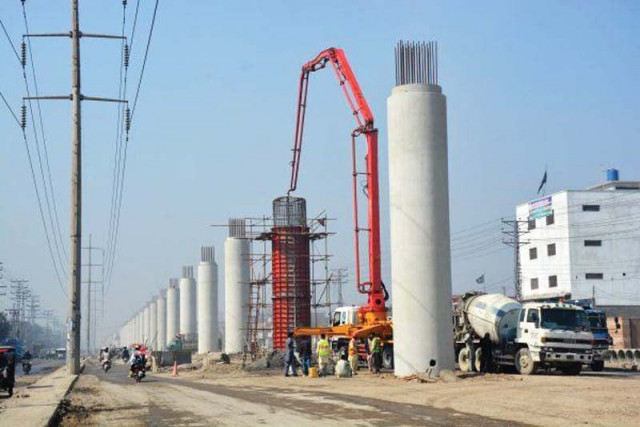Punjab seeks Rs20b tax exemption for Orange Line train project
Says federal govt ought to provide same concessions as those to CPEC projects

Punjab also sought complete exemption from payments of sales tax and custom duties on import of machinery and equipment for the construction of the project. PHOTO: FILE
The provincial government is seeking reduction in withholding tax payments and complete exemptions from sales tax and customs duties payments, confirmed federal and provincial governments’ officials to The Express Tribune. The bulk of the exemptions are on account of indirect taxes and the federal tax authorities have estimated their value close to $195 million or Rs20 billion.
Orange Line loans: Deadline nears for BoP payback
The Punjab government has sent a summary to the Ministry of Finance, Revenue and Economic Affairs for a decision in this regard, said officials. However, federal tax authorities are not in favour of granting these exemptions. The decision has to be taken by the Economic Coordination Committee (ECC) of the Cabinet after the government withdrew FBR’s powers to issue statutory regulatory orders under a condition of the International Monetary Fund.
The provincial government moved the summary after the federal government granted similar tax exemptions to two infrastructure projects of CPEC and to the Gwadar Port free zone. The ECC had approved sweeping tax concessions for 40 years to make the Arabian Sea port an important node in Beijing’s ‘One-Belt, One-Road’ strategic initiative. The ECC also gave over Rs33 billion tax benefits to two Chinese firms working on Sukkur-Multan road project and Thakot-Havelian project of the CPEC.
Part of CPEC?
The Orange Line project is part of four miscellaneous schemes that are funded by China under the overall CPEC framework, according to the Ministry of Planning’s Fact Book on CPEC. The provincial and federal governments insist that Orange Line is not part of CPEC but granting similar tax benefits may dent political stance.
We have requested the federal government to charge only 6% withholding taxes to be deducted from the payments to the project contractors and waive off the remaining amount, according to provincial government authorities. Punjab’s demand appears justified, as at the time of awarding the contract the rate was 6%, which project authorities had built into the overall cost of the scheme.
Later on, the Federal Board of Revenue (FBR) increased the rate to 7% for those contractors who file income tax returns and 12% for non-filers. The fluctuations in rates highlight the inconsistency in government’s economic policies that often carry adverse implications for foreign direct investment.
Punjab also sought complete exemptions from payments of sales tax and customs duties on import of machinery and equipment for construction of the project. Its viewpoint is that tax payments at the import stage are just transfer payments having no real economic value. The provincial authorities argued that in case of government-funded projects, there should be no indirect taxes at all.
The federal government and the Export-Import (Exim) Bank of China have signed the government-to-government concessional loan and export buyer credit to finance the $1.6 billion project. The provincial government will repay the loan.
Project details
The project envisages construction of a 27.1-km long dedicated signal free corridor for mass transit system in Lahore. The corridor will be capable of accommodating trains running both ways with a capacity of 30,000 passengers per hour.
Public transport: ‘Metro train a step in the right direction’
So far, China has disbursed $441 million loan and slightly over half of the construction work has already been done.
The FBR is not ready to back tax concessions for the project, as any such decision would carry implications for its revenue collection that remained almost flat in the first quarter of this fiscal year. “The FBR will give its views once the matter is presented to the ECC for a decision,” said FBR Chairman Nisar Mohammad Khan. In principle, tax authorities are opposed to any kind of exemptions, he added.
The project faces challenges during the construction phase, after a Lahore High Court division bench disallowed construction near ten heritage sites until after a fresh heritage impact assessment by an independent panel of experts, constituted preferably in consultation with the UNESCO, is carried out.
Published in The Express Tribune, October 12th, 2016.
Like Business on Facebook, follow @TribuneBiz on Twitter to stay informed and join in the conversation.



















COMMENTS
Comments are moderated and generally will be posted if they are on-topic and not abusive.
For more information, please see our Comments FAQ